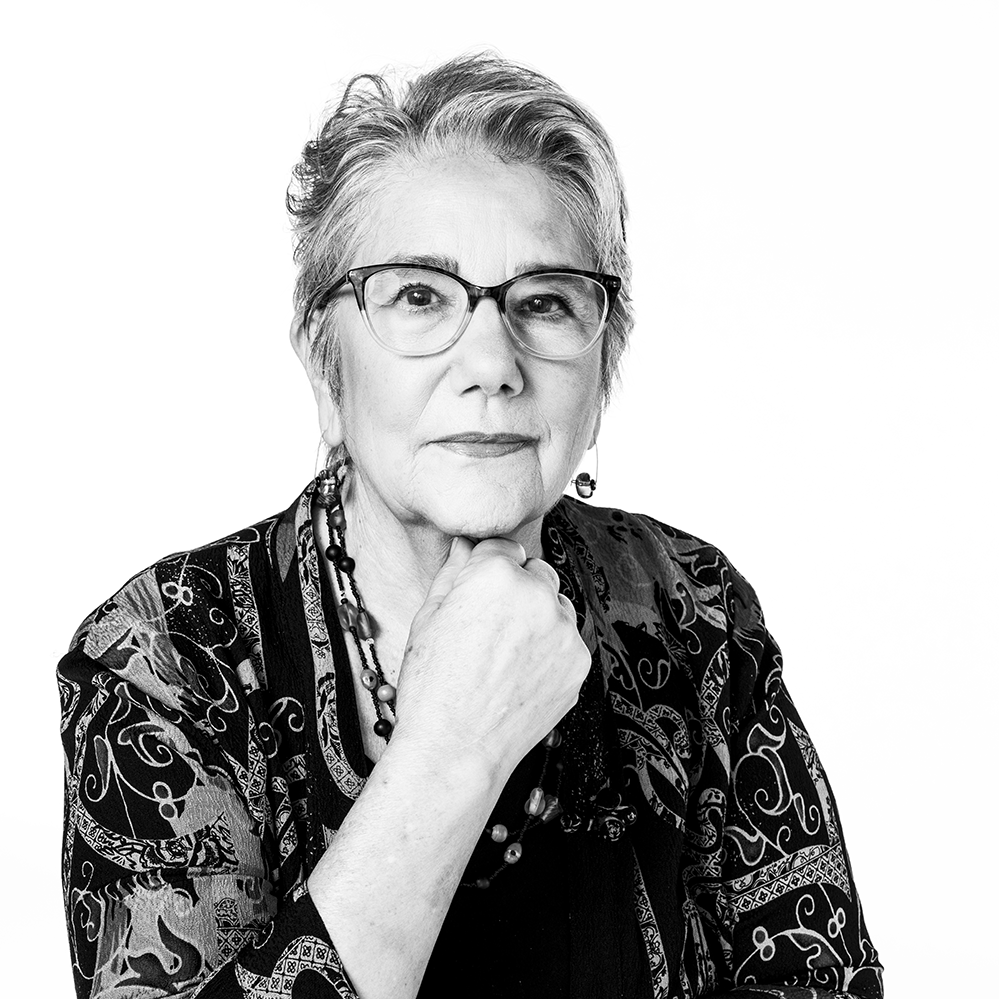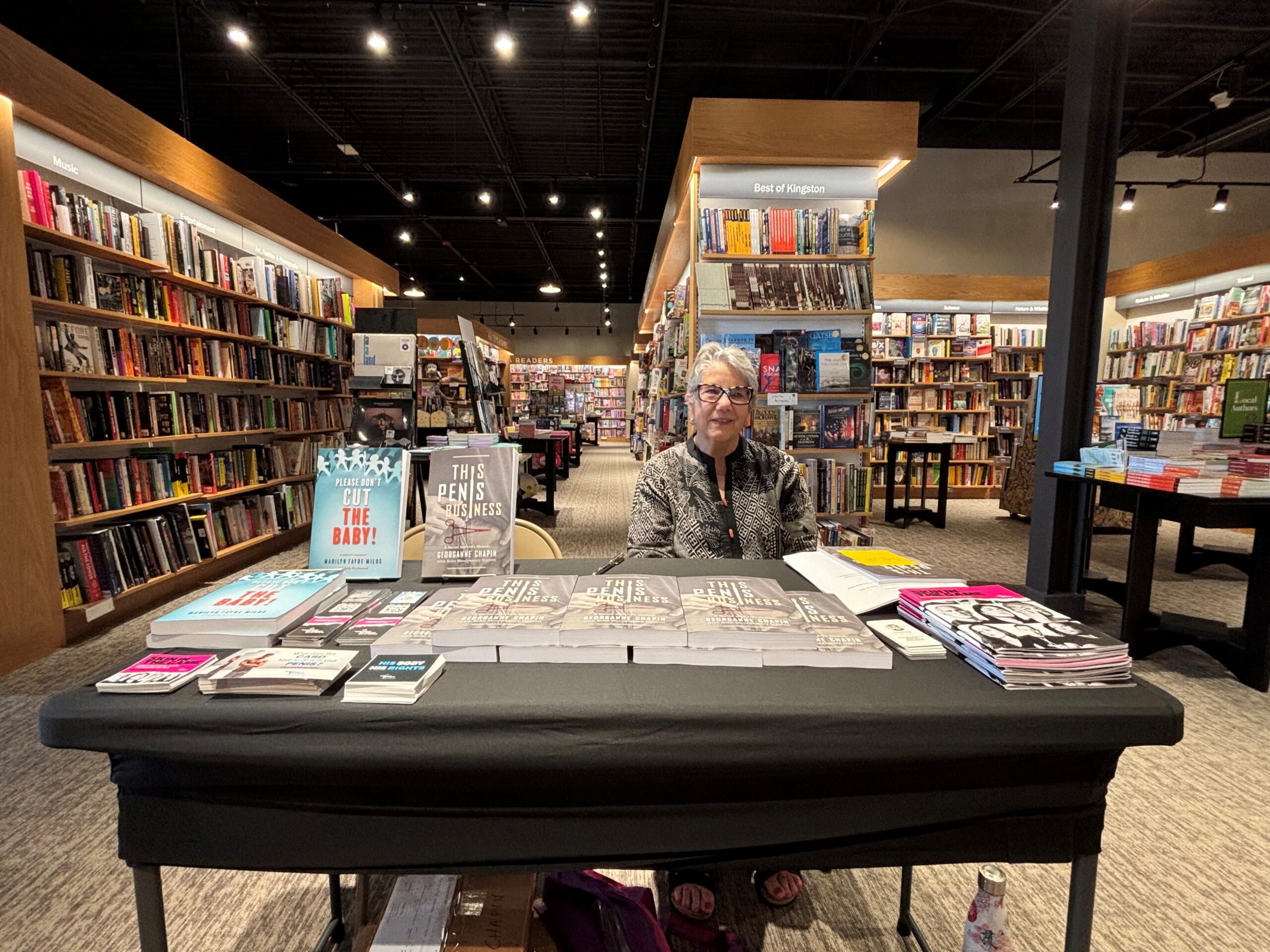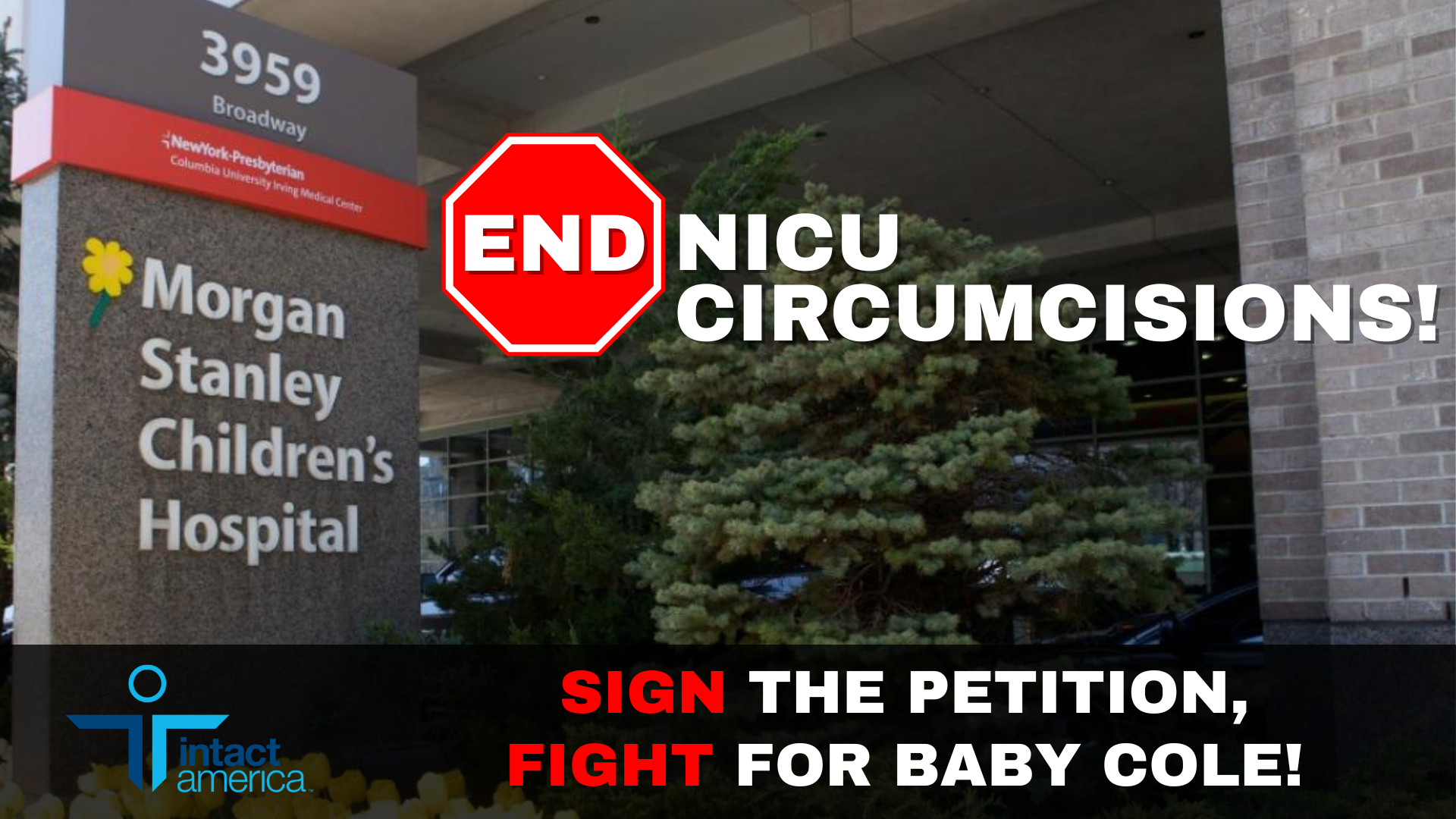| CALLING THE AMERICAN ACADEMY OF PEDIATRICS (AAP) TO ACCOUNT |
| by Georganne Chapin |
Just about a year ago, after an article published in the journal Pediatrics called for minimizing painful medical procedures in children, Intact America launched a petition. As of last week, more than 12,000 people had signed that petition, demanding that the AAP tell its member pediatricians to “End the Pain,” and stop circumcising baby boys.
The petition and our demand were further bolstered by an odd piece published in the April 2016 issue of that same journal, Pediatrics, by pediatric urologist Andrew Freedman. If his name sounds familiar to you, perhaps it’s because Freedman, in addition to being a member of the AAP’s Circumcision Task Force that in 2012 published the Academy’s revised policy on the subject of foreskin removal, made headlines by openly talking about circumcising his own son on his parents’ (the boy’s grandparents’) kitchen table.
Freedman’s April 2016 statement sought to “clarify” the meaning of the 2012 Report’s “benefits outweigh the risks” position. According to Freedman, the report wasn’t really talking about the medical benefits of forced foreskin removal from babies who cannot consent, but rather the overall benefits, “given the role of the phallus in our culture….” What’s important, he says, is that parents who choose circumcision for their boys should have “access” to the procedure, in the form of third-party (Medicaid or private insurance) payment (to doctors and hospitals, of course).
Clearly, there’s a lot more we could say here. But for now, we want to thank those of you who signed the petition and tell you that, together with the 12,160 signatures, it’s been forwarded to Dr. Karen Remley, Chief Executive Officer of the AAP. You can see my letter to Dr. Remley below. We will keep you posted on the AAP’s response.

March 2, 2017
Karen Remley, MD, MBA, MPH, FAAP
CEO/Executive Director
The American Academy of Pediatrics
141 Northwest Point Boulevard
Elk Grove Village, IL 60007-1098
Dear Dr. Remley:
A year ago, the American Academy of Pediatrics Committee on Fetus and Newborn and Section on Anesthesiology and Pain Medicine published “Prevention and Management of Procedural Pain in the Neonate: An Update” in the February 2016 issue of Pediatrics. The study prompted the AAP to call for hospitals to minimize the number of painful procedures performed on newborns.
Unfortunately, the AAP did not take the next logical step: acknowledging that the painful and medically unnecessary circumcision of baby boys should cease.
Today, Intact America is submitting to you a petition, signed by more than 11,000 men and women, asking the AAP to take that step and call for your members to stop circumcising baby boys.
For every signature we received, we know there are dozens of other Americans who believe that circumcision needlessly subjects our baby boys to excruciating pain and robs them of a part of their anatomy that is important to their future sexual health.
As the AAP itself acknowledges, routine circumcision is not medically necessary. (Source: “Should the Baby Be Circumcised?,” on the AAP’s HealthyChildren.org website.) Yet, the public perception persists that the AAP recommends the procedure—a perception refuted in a 2016 commentary by Andrew Freedman, MD, pediatric urologist and a member of the Circumcision Task Force that formulated the Academy’s 2012 statement.
“To many, especially in the lay press, [the 2012 AAP statement] was interpreted as moving the needle from a neutral stance… to being pro-circumcision,” Dr. Freedman wrote in, “The Circumcision Debate: Beyond Benefits and Risks,” published in the April 2016 Pediatrics. However, Dr. Freedman explained, the statement’s actual point was that “the procedure’s benefits justify access to this procedure for families who choose it.” (Emphasis added.)
Regarding infant circumcision, parental choice is determined more by culture than health concerns, Dr. Freedman further noted. “Most circumcisions are done due to religious and cultural tradition. In the West, although parents may use the conflicting medical literature to buttress their own beliefs and desires, for the most part, parents choose what they want for a wide variety of nonmedical reasons.”
The AAP should not be complicit in encouraging parents to make a cultural decision under the pretense of science. The AAP must publicly recognize, in an official communication, that an erroneous perception exists and that the AAP does not and has never recommended circumcision as a medical necessity. The AAP also must ask pediatricians to inform parents accordingly. We urge you to take such action.
We also ask that the AAP educate its member pediatricians about the role of the foreskin in (1) protecting the glans, and (2) sexual pleasure—two major benefits not acknowledged in the 2012 assessment of benefits and risks.
In addition, we ask that you correct the mistaken assertion in the 2012 Task Force Report that a boy’s foreskin will usually separate from the glans by 2-4 months of age; while expert opinion on the average age of spontaneous foreskin retraction varies wildly around the world, the AAP’s own HealthyChildren.org says, “Most boys will be able to retract their foreskins by the time they are 5 years old, yet others will not be able to until the teen years.”[1] (The Pediatric Society of New Zealand says “by age 18”[2]; the British Association of Urological Surgeons says “by age 10.”[3] A Danish medical survey found the mean age of first foreskin retraction to be 10.4 years.[4])
We believe that your members should be advised that forcible retraction of a boy’s foreskin is never indicated, because the age of spontaneous retraction is variable and might not occur until late adolescence. It is important that the AAP correct the record, because many American health professionals are unfamiliar with the normal intact male penis, and believe that it is necessary to force separation of the foreskin from the glans —potentially causing boys extreme pain and—potentially—lasting physical damage.
Finally, as our enclosed petition demonstrates, we continue to ask you to tell pediatricians to end the pain, and stop circumcising baby boys.
Both the American Academy of Pediatrics and Intact America share a common goal – protecting the health and wellbeing of children. We can and should work together toward that goal.
Sincerely,
Georganne Chapin, MPhil, JD
Executive Director
[1] https://www.healthychildren.org/English/ages-stages/baby/bathing-skin-care/Pages/Care-for-an-Uncircumcised-Penis.aspx
[2] http://www.kidshealth.org.nz/foreskin-care
[3] http://www.baus.org.uk/patients/conditions/13/tight_foreskin_phimosis
[4] Thorvaldsen MA, Meyhoff H. Patologisk eller fysiologisk fimose? [Phimosis: Pathological or physiological?] Ugeskr Læger. 2005;167(17):1858- 62.








Robin
March 7, 2017 9:59 pmAwesome letter, thanks!!
Pratt
March 8, 2017 2:19 pmCircumcision does not seem to have been a problem for at least a couple of thousand years. Now it has been made into a problem. While I do not deny the right of some group to form an opinion of any issue, I am not certain that circumcision is anywhere near the problem it is purported to be. In my opinion a far greater problem including infant pain is the matter of abortion. Why not use your energy and initiatives on fighting a real issue: that of brutally murdering defenseless infants. No, I am not preaching any religious belief. Yes, I am calling attention to the deliberate murder of unborn infants. Ask anyone who cannot conceive what the personal value of a baby is. Economically speaking consider the negative results of the huge number of murdered infants upon the economy for all products and services.
Anthony
March 9, 2017 7:53 amWhat a moron.
Daniel Rold
November 9, 2017 11:17 pmYou are an IDIOT!!!! Name the structure and function of the foreskin???? YOU CANT!!!
Daniel Rold
November 9, 2017 11:19 pmSlavery wasn’t a problem for thousands of years. Does that make you want to sign up to be a slave??? IDIOT!!!
Pratt
March 13, 2017 11:51 amAnthony, please explain your comment ‘what a moron’?
Anthony
October 21, 2017 7:13 pmSorry for the delayed response but I didn’t know you had asked me a question until now. Your comment was moronic because it was comprised of assertions and opinions without any argument, reasoning or evidence.
“Circumcision does not seem to have been a problem for at least a couple of thousand years.”
How something *seems* to you is irrelevant. All that matters is the facts, of which you are obviously ignorant. Do some research.
“Now it has been made into a problem.”
Baseless assertion. Now the problem is being more widely recognised and spoken about.
“While I do not deny the right of some group to form an opinion of any issue, I am not certain that circumcision is anywhere near the problem it is purported to be.”
Again, what you are certain about is irrelevant. You are obviously ignorant on the issue. Male circumcision may not be a problem for you personally, but, again, that is irrelevant.
“In my opinion a far greater problem including infant pain is the matter of abortion.”
Again, your opinion is irrelevant unless it is supported with a logical argument.
“Why not use your energy and initiatives on fighting a real issue: that of brutally murdering defenseless infants.”
Baseless assertion that one issue is “real” and the other isn’t. Again, no argument provided. Obviously many people believe infant and child circumcision to be a real issue.
“No, I am not preaching any religious belief. Yes, I am calling attention to the deliberate murder of unborn infants.”
And intactivists are calling attention to the deliberate mutilation of infants.
“Ask anyone who cannot conceive what the personal value of a baby is.”
Ask any sexually active intact man what the personal value of his foreskin is. Ask anyone damaged by circumcision what the personal value of the operation is to them.
“Economically speaking consider the negative results of the huge number of murdered infants upon the economy for all products and services.”
This statement is just bizarre.
Sanford (Sandy) D'Esopo
March 20, 2017 11:17 amCome now, Pratt. Abortion and circumcision are completely unrelated. Comparing apples to oranges only clouds both issues.
larryzb
October 21, 2017 2:21 pmSadly, abortion will not end until women – en masse – reject it. But, those who decry circumcision and do not also condemn abortion are being arbitrary as to which rights of children they will speak up for.
Anthony
October 21, 2017 7:23 pmSome intactivists are ‘pro life’ and some aren’t. Some doubtless take a more nuanced perspective of the abortion issue.
I can understand why people condemn abortion (especially late-term abortion) and I think abortion is a regrettable and painful choice. However, the abortion debate is inextricably enmeshed with the philosophical question of when life begins, if indeed it begins at all. The answer to this question may result in different perspectives on abortion. The circumcision debate is also inextricably enmeshed with a philosophical question, that of where a parent’s rights end and a child’s rights begin. If you believe that people should have self-determination over their own bodies (as most people do when considering female genitals) then you will naturally be against infant and child circumcision (absent genuine medical indication).
Daniel Rold
November 9, 2017 11:15 pmWe are begging cowards to stop mutilating and sexually knife molesting babies? What planet am I on? I’m not from this species.